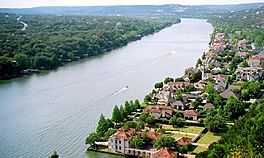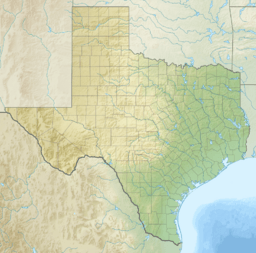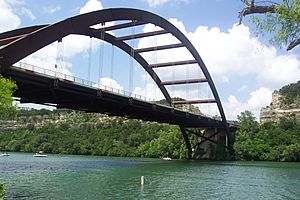Lake Austin facts for kids
Quick facts for kids Lake Austin |
|
|---|---|

Seen from Mount Bonnell
|
|
| Location | Austin, Texas |
| Coordinates | 30°17.66′N 97°47.18′W / 30.29433°N 97.78633°W |
| Lake type | Hydroelectric reservoir |
| Part of | The Texas Highland Lakes |
| Primary inflows | Colorado River (from Lake Travis) |
| Primary outflows | Colorado River (into Lady Bird Lake) |
| Basin countries | United States |
| Managing agency | Lower Colorado River Authority |
| Built | 1939 |
| Surface area | 1,599 acres (647 ha) |
| Max. depth | 75 ft (23 m) |
| Surface elevation | 492 ft (150 m) above sea level |
Lake Austin, once called Lake McDonald, is a large reservoir (a human-made lake) on the Colorado River in Austin, Texas. It was created in 1939 when the Lower Colorado River Authority (LCRA) built the Tom Miller Dam. Lake Austin is one of seven special lakes in Texas known as the Texas Highland Lakes. People use it to help control floods, make electricity, and for fun activities.
Contents
About Lake Austin's Water
Lake Austin is part of the Colorado River in Texas. It starts below the Mansfield Dam. Most of its water comes from Lake Travis, which is upstream.
The lake flows generally from northwest to southeast. It does not have many smaller rivers or streams flowing into it. The biggest ones are Bull Creek and Bee Creek. Bull Creek joins the lake from the north, near where Loop 360 crosses the lake at the Pennybacker Bridge. Bee Creek enters from the west, just above the Tom Miller Dam.
When water leaves Lake Austin through the Tom Miller Dam, it then flows into Lady Bird Lake.
Constant Water Level
Lake Austin is kept at a steady water level. This is done by releasing water from Lake Travis, which is upstream.
Other Highland Lakes on the Colorado River include Lake Buchanan, Inks Lake, Lake LBJ, Lake Marble Falls, and Lake Travis. Lady Bird Lake is downstream from Lake Austin.
History of Lake Austin
The very first lake on this spot was called Lake McDonald. It was formed when the Austin Dam was built between 1890 and 1893.
In 1900, a very strong rainstorm caused the first Austin Dam to break. This led to a lot of flooding. People started to rebuild the dam in 1915. However, the work stopped because of a disagreement. The unfinished dam was then destroyed again by another big storm later that same year.
In 1938, the Lower Colorado River Authority began building the Tom Miller Dam. This dam was finished, and the lake filled up with water in 1939.
Fun Things to Do at Lake Austin
Lake Austin is a popular place for fishing and boating.
Boating Fun
Many companies in the Austin area rent out different kinds of boats. You can rent sailboats, motorboats, canoes, pontoon boats, and even large party boats.
The Austin Parks and Recreation Department also offers classes. You can learn how to canoe, kayak, and sail on the lake.
Fish and Wildlife in the Lake
Lake Austin has been stocked with different types of fish. This helps make it a great place for recreational fishing. The lake is known for having many largemouth bass. Other fish you might find include catfish and sunfish.
Lake Austin used to have a lot of hydrilla. This is a non-native aquatic plant that can cause problems. To help get rid of it, the Lower Colorado River Authority would sometimes lower the lake's water levels in January and February. This allowed the cold air to freeze and destroy much of the hydrilla.
As of March 2014, the hydrilla was completely removed from the lake. The City of Austin did this by putting Asian grass carp into the lake. These fish eat the hydrilla. However, by September 2016, these grass carp started to impact the lake's natural resources. This has caused a decrease in some of the wildlife that naturally lives in this part of the Colorado River.
 | Sharif Bey |
 | Hale Woodruff |
 | Richmond Barthé |
 | Purvis Young |



